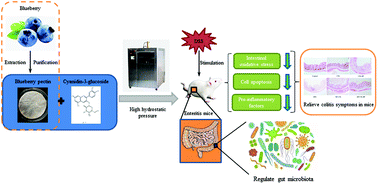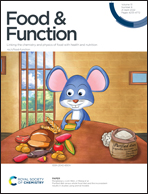Anti-inflammatory and intestinal microbiota modulation properties of high hydrostatic pressure treated cyanidin-3-glucoside and blueberry pectin complexes on dextran sodium sulfate-induced ulcerative colitis mice†
Abstract
This study investigated the anti-inflammatory effects of cyanidin-3-glucoside (C3G) and blueberry pectin (BP) complexes on mice with dextran sodium sulfate (DSS)-induced colitis before and after high hydrostatic pressure (HHP) treatment. Real-time polymerase chain reaction (RT-PCR), western blotting, and 16S rDNA sequencing were used to study the expression of inflammation-related factors, activation of signal pathway-related proteins, and changes in the intestinal flora in ulcerative colitis (UC) mice. The results showed that HHP-treated C3G-BP complexes significantly relieved diarrhea and blood loss in the stool of UC mice and alleviated colon shortening. The potential mechanism of action involved reduction in intestinal oxidative stress mRNA expression of pro-inflammatory factors, improvement in anti-inflammatory factor levels, inhibition of the NF-κB signaling pathway, increased protein levels of Bcl-2/Bax and caspase-3/cleaved caspase-3 genes, and improved gut microbiota composition. Compared with other experimental groups, the HHP-treated C3G-BP complexes group exhibited the best anti-inflammatory effect on DSS-induced UC mice. The results may provide new ideas for using C3G-BP complexes for treating UC and help develop better processing methods.



 Please wait while we load your content...
Please wait while we load your content...